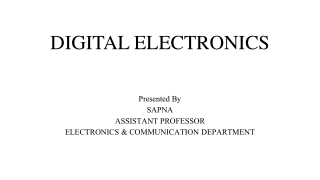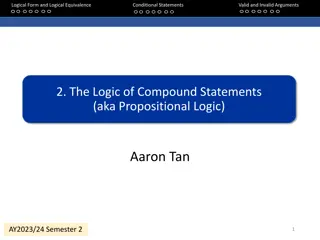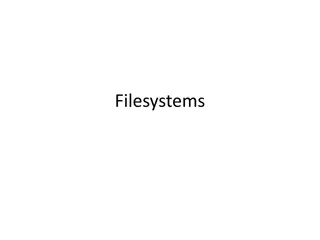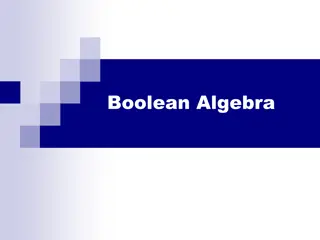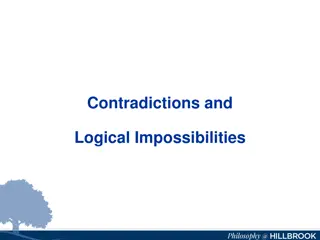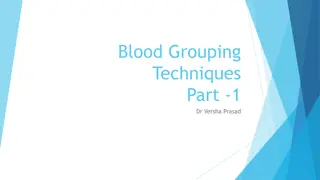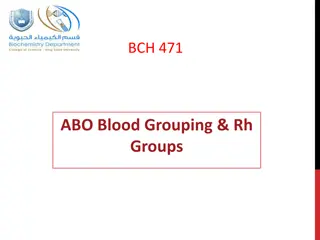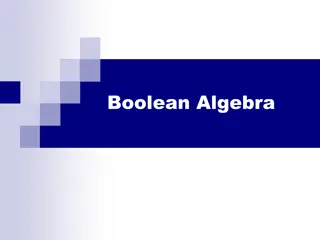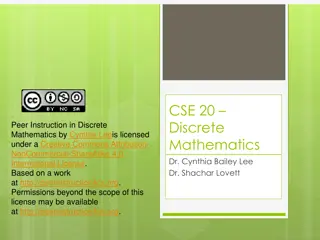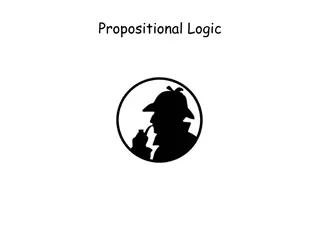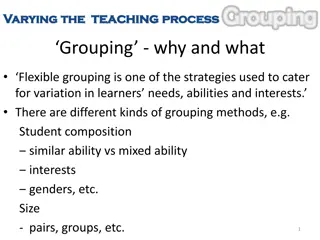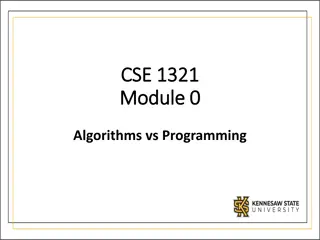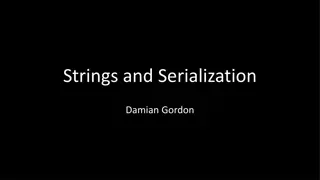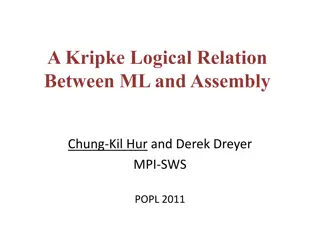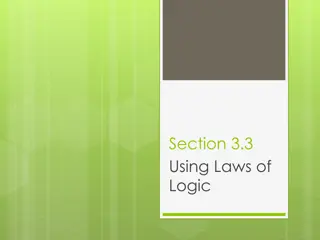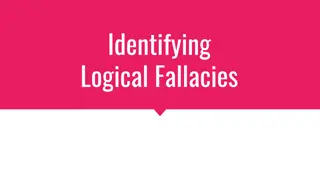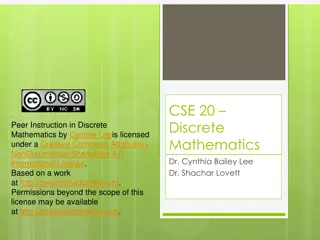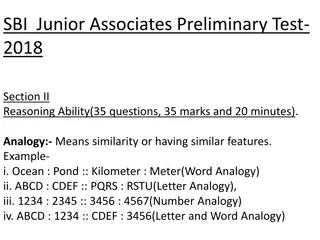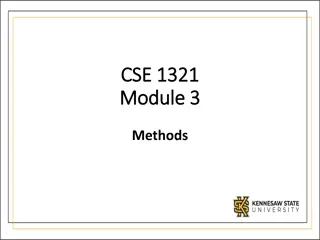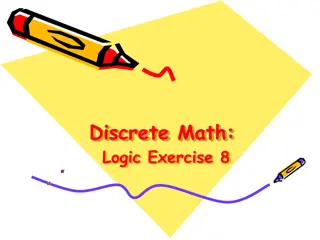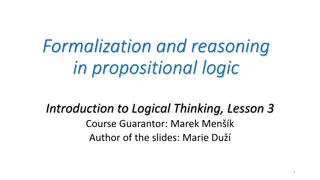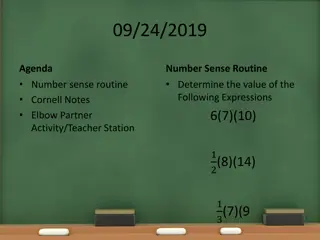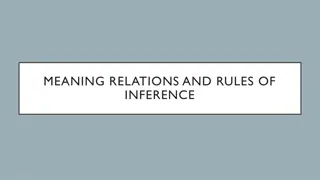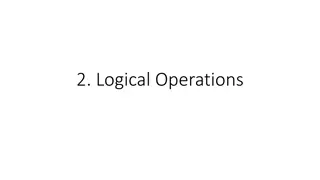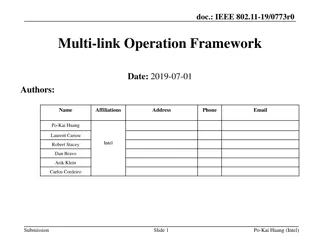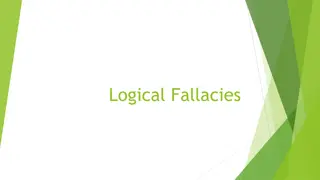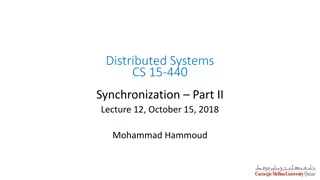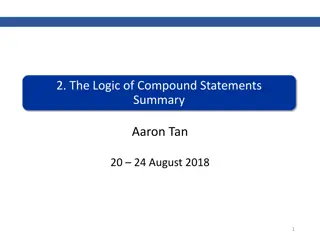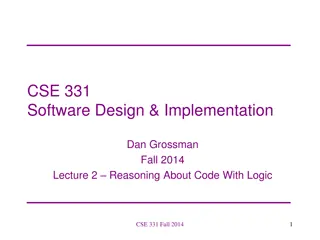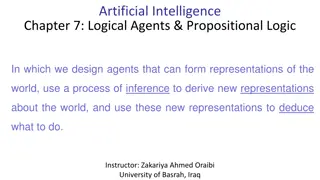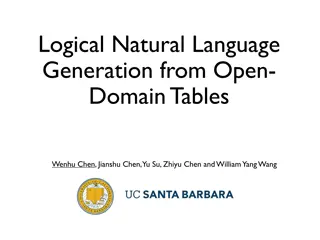DIGITAL ELECTRONICS
Introduction to digital electronics covering binary digits, logic levels, boolean algebra, logical operators (AND, OR, NOT), laws of boolean algebra, and operations like logical multiplication and addition. Learn about the fundamental concepts essential for understanding digital circuits and operati
0 views • 67 slides
Logical Form and Equivalence in Conditional Statements
Delve into the intricacies of logical form, equivalence, and compound statements in the realm of propositional logic. Explore valid and invalid arguments, conditional statements, and the logic of compound statements with puzzles to sharpen your logical reasoning skills. Unravel scenarios like determ
4 views • 81 slides
Filesystems: A Comprehensive Overview
File systems provide a structured approach to storing and organizing data on secondary storage devices. They involve logical organization of files, directories for grouping related files, sharing data between users, and managing permissions. Files contain data with attributes like size, ownership, a
4 views • 29 slides
Logical Expressions and Symbolism in Sentential Logic
Understanding sentential logic, logical expressions, and symbols through examples of logical reasoning and inference. Explore the concepts of logical OR, AND, negation, and the complexities of inclusive and exclusive logic in various scenarios.
1 views • 33 slides
Boolean Algebra and Logical Statements
Introduction to Boolean algebra, logical statements, and compound statements. Explore the concepts of Boolean variables, logical operators, writing conventions, equivalence in Boolean algebra, and truth tables. Learn how to analyze and evaluate logical expressions using truth tables.
1 views • 25 slides
Contradictions and Logical Impossibilities
Explore a series of paradoxes and logical puzzles, ranging from being in two places at once to time travel conundrums. Discover the concept of contradictions and logical impossibilities through thought-provoking scenarios and riddles. Dive into the realm of impossibilities and challenge your underst
1 views • 6 slides
Blood Grouping Techniques: Methods and Advantages
Various blood grouping techniques including slide or tile method and microplate technique are discussed. Advantages of microplate ABO grouping such as cost-effectiveness, automation potential, and reduction in errors are highlighted. The use of different manual methods and newer techniques in blood
0 views • 11 slides
Enhancing Logical Reasoning in Decision Making Process
Federal Criterion #28 emphasizes the importance of stating logical reasons for decisions that align with findings of fact and conclusions of law. This criterion is key to ensuring fairness and accuracy in legal analysis. The scoring criteria, national appeals review results, and ways to improve scor
1 views • 8 slides
ABO Blood Grouping and Rh Groups
ABO blood grouping and Rh factor testing are crucial for blood transfusions and forensic medicine. The presence or absence of specific antigens and antibodies in human blood determines blood type. Genetic inheritance from parents establishes blood type, with codominance influencing offspring phenoty
0 views • 13 slides
Boolean Algebra and Logical Statements
Boolean Algebra allows for formalizing logical reasoning using variables that can be either true or false. It involves logical statements, compound expressions, logical operators like AND, OR, NOT, writing conventions, equivalence, and truth tables to determine the truth values of statements. By und
0 views • 25 slides
Logical Connectives in Discrete Mathematics
Explore the world of propositional logic and truth tables in discrete mathematics through a peer-instruction approach. Learn about basic logical connectives, new connectives, complex formulas, operator precedence, and the nuances of implication (implies) with engaging examples. Delve into scenarios
0 views • 14 slides
Propositional Logic and Logical Operators
Learn about propositional logic, statements, logic operators, compound statements, exclusive-or, logical equivalence, and writing logical formulas for truth tables. Explore how to create compound statements for exclusive-or using different approaches and ensure logical equivalence. Enhance your know
1 views • 26 slides
Enhancing English Classrooms through Flexible Grouping Strategies
Strategies for grouping students in English classrooms are explored, focusing on the benefits of flexible grouping to cater to diverse learner needs. Various grouping methods, such as mixed ability and similar ability groupings, are discussed alongside a lesson example on exploring different aspects
0 views • 32 slides
Algorithms and Programming: A Visual Introduction
Explore the fundamental concepts of algorithms and programming through visual representations and practical examples. Learn about algorithmic thinking, abstraction, recipe-like algorithms, and the importance of logical steps in accomplishing tasks. Discover how algorithms encapsulate data and instru
1 views • 17 slides
Regular Expressions for String Manipulation
Regular expressions are powerful tools for defining search patterns in strings. They consist of basic patterns like logical OR, grouping, and quantification, as well as qualifications like zero or more occurrences. The Python Standard Library provides the 're' module for working with regular express
0 views • 32 slides
Logical Relations in Programming Languages
Explore the concept of logical relations in programming languages, focusing on the relation between high-level and low-level programs. Learn about contextual equivalence, its benefits and limitations, and how logical relations offer a robust framework for defining program equivalence. Discover why l
1 views • 18 slides
Laws of Logic and Logical Reasoning
Laws of logic play a crucial role in reasoning and making deductions. This comprehensive guide explains the use of contrapositives, examples of conditional statements, and the significance of laws like the Law of Syllogism. Understanding these principles helps in effectively analyzing statements and
0 views • 8 slides
Introduction to Symbolic Logic: Understanding Logical Inferences
Logic is the study of reasoning methods to distinguish between correct and incorrect arguments. Symbolic Logic involves representing logic symbolically for easier understanding and manipulation. Logical inferences help in making decisions based on reasoning chains. The content discusses the use of l
1 views • 28 slides
Taxonomy and Classification Systems
Explore the world of taxonomy, classification, and binomial nomenclature through the works of Carl Linnaeus. From organizing items in closets to grouping organisms in a logical manner, discover the importance of naming and categorizing in a structured and systematic way.
0 views • 18 slides
Identifying Logical Fallacies in Sources: Presentation Assignment
Learn to identify logical fallacies in various sources by analyzing passages and applying the Logical Fallacy Referee tool. Work in pairs to select sources, identify fallacies, and present annotated examples to the class.
0 views • 7 slides
Peer Instruction in Discrete Mathematics
Explore the world of discrete mathematics with Dr. Cynthia Bailey Lee and Dr. Shachar Lovett through peer instruction. Dive into topics like step-by-step equivalence proofs and the equivalence of logical operators. Discover the different methods to show propositions are equivalent and delve into log
0 views • 14 slides
Reasoning Ability Test - Analogy, Classification, Coding-Decoding Examples
Explore analogy, classification, and coding-decoding examples from the SBI Junior Associates Preliminary Test 2018 section on Reasoning Ability. Test your logical thinking skills with questions and answers related to similarities, grouping objects, and secret message patterns.
0 views • 10 slides
The Importance of Functions in Programming
Functions in programming serve as a logical grouping of statements, allowing for reusable chunks of code that can be written once and called multiple times. By using functions, developers can work at a higher level of abstraction, reduce complexity, and minimize the code size. Functions eliminate th
0 views • 40 slides
Propositions and Logical Connectives Exercise Solutions
In this exercise, propositions involving grizzly bears, hiking safety, and ripe berries are formulated using logical connectives. Solutions are provided for various scenarios including conjunctions, conditionals, biconditionals, and more. The explanations offer a structured approach to understanding
1 views • 6 slides
Introduction to Propositional Logic: Formalization and Reasoning
Understanding formalization in propositional logic involves replacing atomic propositions with propositional variables and natural language connectives with logical connectives. The process abstracts from internal proposition structure, reducing meaning to True or False. The language allows formaliz
0 views • 18 slides
The Logical Structure of Classical and Quantum Mechanics
The paper explores the common logical structure shared between classical and quantum mechanics, emphasizing the non-distributive lattice embedded in a distributive one. It discusses how all physical theories must adhere to this structure, incorporating topology, Heyting algebra, Boolean algebra, and
2 views • 36 slides
Algebraic Expressions Lesson Overview
This lesson focuses on writing and reading algebraic and written expressions with grouping symbols and less than. Students will learn how to translate expressions containing groupings and less than. The lesson is designed to build on the previous day's lesson and challenge students' thinking. It set
0 views • 25 slides
Introduction to Logical Thinking in Computer Science at VSB - Technical University of Ostrava
This course introduces the concept of logical thinking in Computer Science at VSB - Technical University of Ostrava. Topics include valid arguments, deductive reasoning, and the science of correct reasoning. Requirements for passing the course include written tests and exams with specified grade ran
0 views • 18 slides
Meaning, Relations, and Rules of Inference in Logic
Exploring the concept of meaning, relations, and rules of inference in logic through the use of truth tables to evaluate logical formulas. Discover how tautologies and contradictions are identified, and how logical operators influence the truth values of propositions. Delve into examples that showca
0 views • 24 slides
Optimizing Multi-Party Video Conferencing through Server Selection and Topology Control
This paper proposes innovative methods for multi-server placement and topology control in multi-party video conferences. It introduces a three-step procedure to minimize end-to-end delays between client pairs using D-Grouping and convex optimization. The study demonstrates how combining D-Grouping,
0 views • 13 slides
Logical Operations and Their Applications
Logical operators such as AND, OR, NOT, and XOR play a crucial role in programming and control systems. They are used to combine logical expressions and make decisions based on certain conditions. By utilizing truth tables, these operators help in solving problems efficiently. This article explores
0 views • 24 slides
IEEE 802.11-19/0773r0 Multi-link Operation Framework Summary
The document discusses the multi-link operation framework for IEEE 802.11-19/0773r0, focusing on load balancing and aggregation use cases. It introduces terminology related to multi-link logical entities and provides examples of multi-link AP and non-AP logical entities. The framework considers stee
0 views • 16 slides
Logical Fallacies: Common Types and Examples
Logical fallacies are errors in reasoning that can undermine the validity of arguments. This content covers various types of fallacies such as circular logic, either/or fallacy, oversimplification, overgeneralization, stereotyping, and ad hominem attacks. Examples and explanations are provided for e
0 views • 16 slides
Distributed System Synchronization and Logical Clocks
Continuing from the previous lecture on time synchronization, this session delved into logical clock synchronization, mutual exclusion, and election algorithms in distributed systems. Logical clocks, such as Lamport's Clock and Vector Clock, play a crucial role in defining the order of events withou
0 views • 33 slides
Compound Statements in Logic
The summary discusses the logic of compound statements, covering logical form, equivalence, tautologies, contradictions, conditional statements, valid and invalid arguments, and more. It explains the definitions of statements, negation, conjunction, disjunction, statement form, logical equivalence,
0 views • 12 slides
Logical Reasoning in Software Design and Implementation
Logical reasoning in software development involves determining the truth of facts as a program runs under specific assumptions. This process complements testing by allowing programmers to reason about classes of inputs/states and verify program correctness. Hoare Logic is introduced as a method for
0 views • 35 slides
Logical Agents and Propositional Logic in AI
Designing logical agents involves forming representations of the world, using inference for deriving new insights, and deducing actions based on these representations. Knowledge Base (KB) is a crucial component, comprising known facts and current percepts to infer hidden states. Propositional logic,
0 views • 23 slides
Enhancing Logical Grouping Mechanisms in Haystack Labs
Formalizing a logical grouping mechanism to standardize practices, promoting extensibility and alignment with existing work in Haystack Labs. Examples illustrate the flexibility and advantage of the system.
0 views • 9 slides
Introduction to Logical Thinking: Science of Correct Reasoning
Logic, the science of correct reasoning, explores ways to infer conclusions from assumptions and validate arguments. This course introduces logic as a tool for analyzing arguments, automating processes, and enhancing communication clarity. Through classic logic variants like propositional and predic
0 views • 30 slides
Advancements in Logical Natural Language Generation from Open-Domain Tables
Cutting-edge research in logical natural language generation (NLG) is transforming the field by moving beyond traditional surface realization to generate summarized text, conclude trends, and apply logical and mathematical operations. By addressing limitations such as lack of logical inference, summ
0 views • 33 slides
